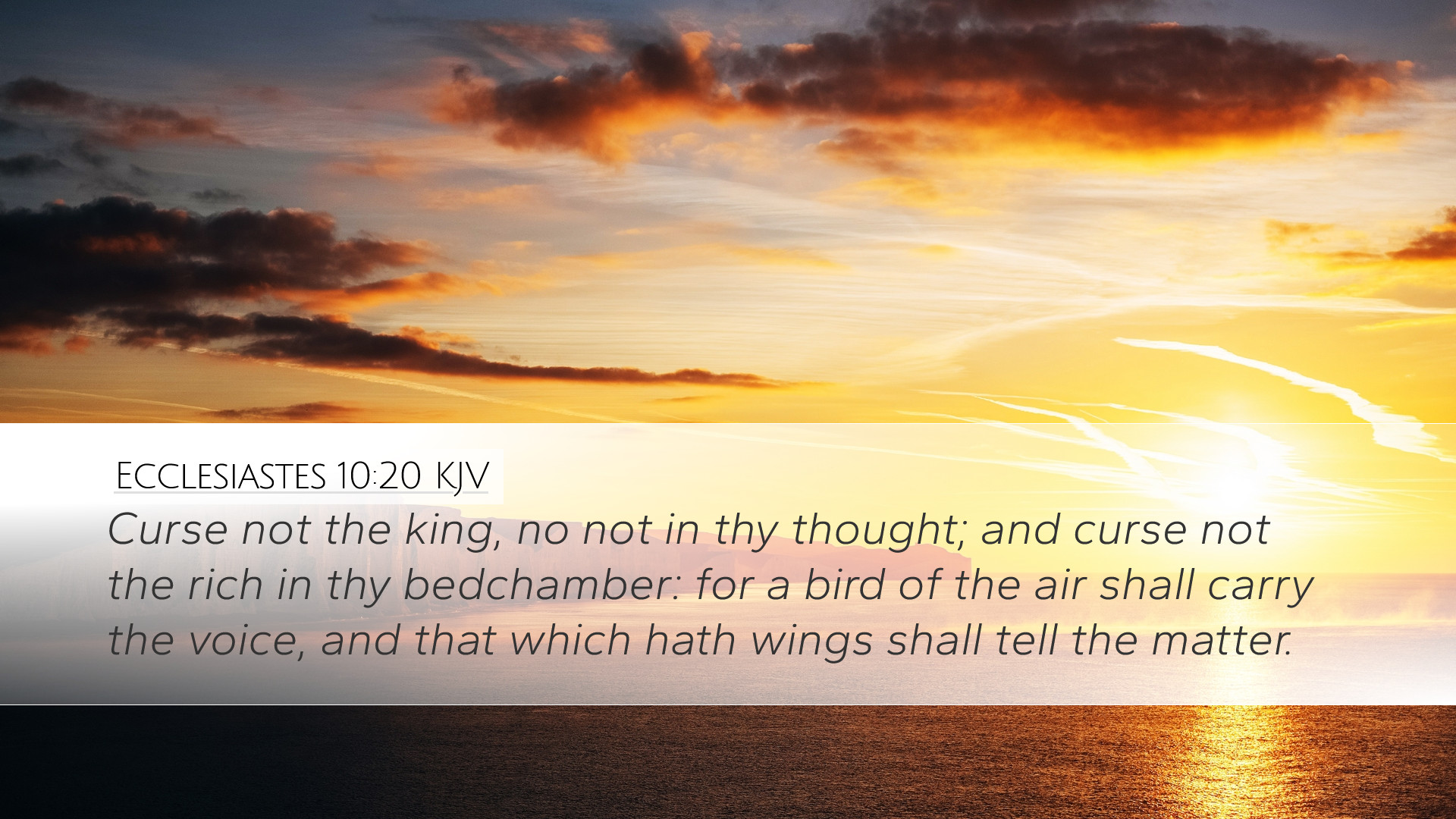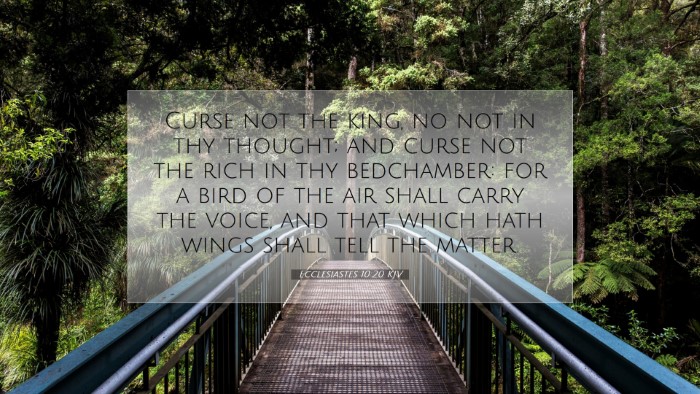Commentary on Ecclesiastes 10:20
Verse: Ecclesiastes 10:20 - “Curse not the king, no not in thy thought; and curse not the rich in thy bedchamber: for a bird of the air shall carry the voice, and that which hath wings shall tell the matter.”
Introduction
The book of Ecclesiastes, attributed to Solomon, often explores the transient nature of life and the complexities of human behavior. Ecclesiastes 10:20 offers a poignant warning regarding one’s speech, particularly concerning authority figures and the implications of harboring contemptuous thoughts. This commentary synthesizes insights from notable public domain commentators to illuminate its rich meaning and applications for readers today.
Insights from Commentators
Matthew Henry’s Commentary
Matthew Henry emphasizes the importance of respecting authority, specifically kings and the wealthy. He suggests that even private thoughts and words carry weight and may be revealed, thus advising caution in our expressions of discontent or disdain. Henry states:
- The act of cursing or speaking ill of the authority can lead to personal consequences.
- Thoughts of contempt, if harbored, can ultimately manifest in words or actions, which may have unforeseen ramifications.
- There is a warning regarding the omnipresence of information—like a bird, it can easily carry our secret thoughts beyond our control.
Through this lens, Henry points to a broader biblical principle: the stewardship of one’s speech is an essential aspect of wisdom.
Albert Barnes’ Notes
Albert Barnes, in his exegesis, interprets the injunction against cursing kings as reflective of an overarching principle of restraint in our communications about people in power. He notes:
- The phrase “curse not the king” implies a deep respect for the established order, suggesting that such disrespect not only violates social norms but can also invoke divine displeasure.
- The importance of private thoughts being treated as sacred underscores the responsibility of maintaining moral integrity even when alone.
- He stresses that negative words about the wealthy can eventually lead to significant socio-political consequences, as they can influence public opinion.
Barnes highlights the pervasive nature of gossip and the capacity for private grievances to escape into the public domain, thus calling for caution and prudence in our speech.
Adam Clarke’s Commentary
Adam Clarke offers a rich theological reflection on this verse, framing it within the context of the wisdom literature. His observations include:
- Clarke interprets “bird of the air” as a metaphor for the unexpected and uncontrollable nature of communication; once spoken, words can take flight and spread rapidly.
- The admonition against cursing the rich or powerful serves as a reminder of the intricate relationships within society and the potential backlash of such actions.
- He further explores the idea that our thoughts, especially in private, are not as hidden as we may believe and calls for self-examination of one’s inner dialogue.
Clarke’s reflection serves as a deep reminder of the integrity needed in both public and private discourse, advocating for a life where wisdom guides our speech.
Theological Implications
The implications of Ecclesiastes 10:20 stretch beyond mere prudence in speech; they touch on profound theological themes relating to human dignity, respect for authority, and the moral weight of our words. Several key points emerge:
- Respect for Authority: The text encourages not only an outward respect for rulers but also an internal posture that cherishes the divine order they represent.
- Privacy and Accountability: The tension between private thoughts and public consequences is a cautionary tale for believers, emphasizing that God is aware of our innermost intentions.
- Manipulation of Information: The imagery of a bird highlights the vulnerabilities of communication; it metaphorically calls for responsible speaking in a world rife with rumor and hearsay.
Applications for Today
Pastors, theologians, and serious students of the Bible can find a wealth of practical applications in this verse. Chief among them are:
- Guarding the Heart: The insights urge believers to protect their hearts and minds against bitterness towards authority while fostering an attitude of prayer and intercession.
- Moral Integrity in Communication: Restoration of a righteous discourse in every sphere, especially concerning leaders and influential people, cultivates a community reflecting Christlike values.
- Wisdom in Social Media: In the age of digital communication, the principle that “words have wings” serves as a reminder of the lasting impact of our comments online.
Conclusion
Ecclesiastes 10:20 encapsulates a timeless wisdom that resonates profoundly with the challenges faced in modern society. Through the lenses of respected commentators, we are reminded of the need for cautious speech, deep respect for authority, and the importance of guarding our thoughts. As we strive to embody these principles, we contribute positively to the fabric of our communities, living out our faith with integrity and wisdom.


